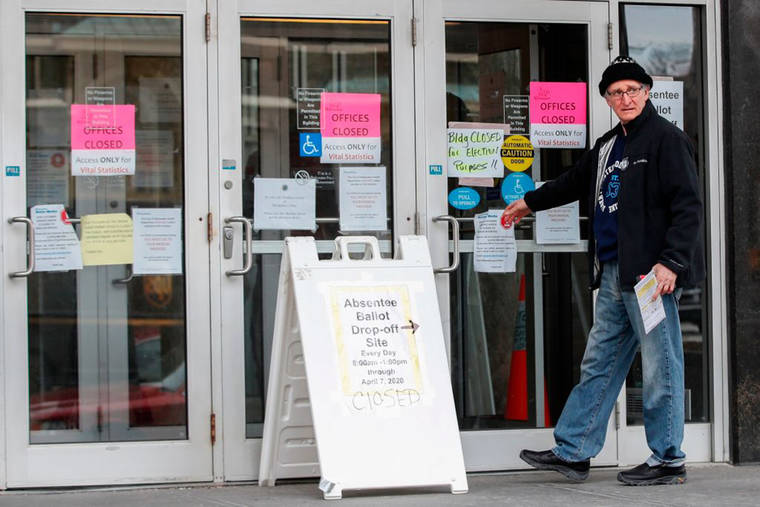Mail-in voting is the best way to ensure that the November 2020 election can proceed safely despite the coronavirus pandemic. It’s all too likely we’ll still be dealing with outbreaks then, and it’s well before we’ll have a vaccine. The U.S. needs to start making plans for mail-in ballots now; and yet President Donald Trump has begun to make it clear he intends to stymie any large-scale vote-by-mail efforts.
Mail-in voting will become the key battleground because it’s essentially the only realistic option for holding an election during a pandemic. Donald Trump can’t delay the Nov. 3 vote — that’s beyond his constitutional power. In fact, the Constitution doesn’t provide any option for suspending or delaying a presidential or congressional election.
Congress “may determine the Time of chusing the Electors, and the Day on which they shall give their Votes,” according to the Constitution, but precedent makes it pretty certain that Congress won’t delay the presidential election either; it didn’t even do so in 1864, when the Civil War was in full swing.
What about the states? Well, technically, individual states could choose their presidential electors themselves, without holding a popular vote. That’s the way states did it in the early decades of the Republic. That history has led some fretful folks to ask me whether some state legislatures might call off the 2020 vote and just let their electors decide how to allocate the states electoral votes. In practice, though, it seems unlikely to the point of impossibility that governors and state legislatures would steal the election from the public.
Hence the dispute over mail-in ballots. Conventional wisdom is that mail-in voting would be good for Democrats and bad for Republicans. I am far from certain that the conventional wisdom will prove to be true, since mail-in voting under pandemic conditions may actually disadvantage some key Democratic constituencies (like young voters, or poor ones, or elderly African-Americans) more than it disadvantages Republican voting blocs. But President Trump seems to be inclined to accept the conventional wisdom.
The upshot is that we are seeing the emergence of a partisan struggle over mail-in voting. As Wisconsin held its own coronavirus-constrained primary, President Trump discouraged the state from creating the extensive mail-in ballot options that alone can solve the problem of voting during a pandemic. Democrats have proposed a bill in Congress, known as the Resilient Elections During Quarantines and Natural Disasters Act of 2020, that would provide financial incentives to push the states to allow absentee, mail-in voting for any reason.
Trump in turn denounced previous Democratic bills in nakedly self-interested terms: “They had things, levels of voting,” he said, “that if you’d ever agreed to it, you’d never have a Republican elected in this country again.”
It’s a hard lift to find a valid reason to oppose letting people vote by mail, considering the broad availability of absentee voting (already available in at least 34 states), not to mention the realities of a global pandemic. Trump’s solution is to point to the threat of voter fraud that he associates with mail-in ballots.
Republicans in recent years have passed voter ID laws aimed to check identification and, in theory, make fraudulent voting more difficult. But as experts have repeatedly pointed out in court battles over these voter ID laws, the actual instances of voter fraud are tiny relative to the pervasiveness and effect of the laws. It’s an open secret that voter ID laws are intended to disproportionately discourage people from groups who tend to vote Democratic from casting ballots.
Naïve as it is to imagine that anything is outside the bounds of partisanship in an election year, it’s still worth making the point that elections are supposed to give effect to the preferences of the voters. No one should have to risk his or her life to go to the polls. If states either constrain absentee voting or lack the resources to enable it to function effectively, the consequences for our democracy could be disastrous. Enabling a free and fair vote even under pandemic conditions should be the very epitome of a nonpartisan objective.
It’s time for responsible Republicans to stand up and say that there is no other choice but mail-in voting. In the spirit of 1864, we must hold the election by any means necessary.
Noah Feldman is a Bloomberg Opinion columnist and host of the podcast “Deep Background.” He is a professor of law at Harvard University and was a clerk to U.S. Supreme Court Justice David Souter. His books include “The Three Lives of James Madison: Genius, Partisan, President.”



